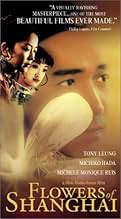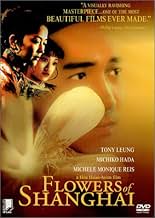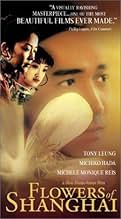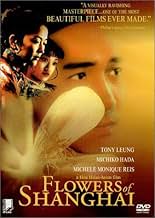VALUTAZIONE IMDb
7,3/10
4435
LA TUA VALUTAZIONE
Aggiungi una trama nella tua linguaIn the "flower houses" (upscale brothels) of Shanghai, various interweaving stories of love, loyalty, and deceit play out subtly.In the "flower houses" (upscale brothels) of Shanghai, various interweaving stories of love, loyalty, and deceit play out subtly.In the "flower houses" (upscale brothels) of Shanghai, various interweaving stories of love, loyalty, and deceit play out subtly.
- Regia
- Sceneggiatura
- Star
- Premi
- 6 vittorie e 6 candidature totali
Tony Leung Chiu-wai
- Wang Lingsheng
- (as Tony Chiu Wai Leung)
Michelle Reis
- Emerald
- (as Michelle Monique Reis)
Carina Lau
- Pearl
- (as Carina Lau Ka-ling)
Rebecca Pan
- Huang
- (as Rebecca Pan Wan-ching)
Tony Chang
- Peking Opera Actor
- (as Tony Chang Ruei-che)
Yiu-Ming Lee
- Azhu
- (as Yu-ming Lee)
Recensioni in evidenza
I have to disagree with the previous poster on this film, I thought it was fantastic and moving. It tells the stories of a set of turn-of-the century courtesans and their client in Shanghai. About 20 characters revolve in and out, yet the director has expertly chosen to focus on key moments and conversations. The movie never leaves the internal rooms of the brothels or "flower houses", and you feel a sense of the entrapped social circumstances that ensnares all the characters. The cinematography is beautiful, taking advantage of low-lighting and inner spaces.
10pcg
This hypnotically beautiful film may recall a dream, but the material world of money and power, indentured servitude and beatings everywhere intrudes on it. We discover in the contrasting stories of Emerald, Pearl, Crimson, Jade, and Crystal, how some survive as "flower girls" and others are crushed. Far from being boring or cold, the film is compelling dramatically and emotionally. "Flowers of Shanghai" seems to contain boundless reserves of sadness and rage -- it is as if the sex and violence are not on screen because Hou cannot bear to show them. If "Flowers of Shanghai" is an opium dream, as many have said, the opium is both bringing pleasure and suppressing pain.
"Flowers of Shanghai" shows compassion for its characters, both the innocents and those who survive through cynical manipulation. The scene-length takes in medium shots work to establish respect for each person within the film, while at the same time bringing about a kind of "rectification of names," systematically exposing the hypocrisy of the brothels. It's appropriate that one of the few moments of violent action in the film occurs when Master Wang smashes the exquisite interior decoration in a room: "Flowers of Shanghai" shows the seductive beauty of the brothel then reveals it to be a cage. Everyone in the film is on multiple levels unfree: the women are financially bound to the brothels and dependent on the whims of their clients, and almost everyone is addicted to opium.
The film never leaves the brothels. This expresses how the brothels in fact own the women. However, as Stephen Teo noted in CinemaScope, there's another detail that's easy to overlook: the women's bound feet prevent them from easily walking more than a few feet.
"Flowers of Shanghai" shows compassion for its characters, both the innocents and those who survive through cynical manipulation. The scene-length takes in medium shots work to establish respect for each person within the film, while at the same time bringing about a kind of "rectification of names," systematically exposing the hypocrisy of the brothels. It's appropriate that one of the few moments of violent action in the film occurs when Master Wang smashes the exquisite interior decoration in a room: "Flowers of Shanghai" shows the seductive beauty of the brothel then reveals it to be a cage. Everyone in the film is on multiple levels unfree: the women are financially bound to the brothels and dependent on the whims of their clients, and almost everyone is addicted to opium.
The film never leaves the brothels. This expresses how the brothels in fact own the women. However, as Stephen Teo noted in CinemaScope, there's another detail that's easy to overlook: the women's bound feet prevent them from easily walking more than a few feet.
I saw this film at Cannes where delegates, including would-be intelligent critics emerged from the film scratching their heads and mumbling 'interesting' - a sure sign that they couldn't understand a word of it. For me it had been an epiphanous experience.
Six months later Cahiers du Cinema voted it the best film of its year...
I am sure there is a word to describe the effect of the film, but I can't lay my hand on it, so I will say 'emotionally disjoint'. As the men sit around playing Mah Jong talking, generally of trivia, huge emotional dramas are going on, but obliquely, in relation to the girls in the brothel. The effect is crushing.
I thought, while watching, mainly of Jean-Marie Straub as it has a minimalist side, but with such greater emotional power and resonance. It is so tragic that this magnificent film has had such a poor release in the west - no theatrical distribution at all in the UK...
Six months later Cahiers du Cinema voted it the best film of its year...
I am sure there is a word to describe the effect of the film, but I can't lay my hand on it, so I will say 'emotionally disjoint'. As the men sit around playing Mah Jong talking, generally of trivia, huge emotional dramas are going on, but obliquely, in relation to the girls in the brothel. The effect is crushing.
I thought, while watching, mainly of Jean-Marie Straub as it has a minimalist side, but with such greater emotional power and resonance. It is so tragic that this magnificent film has had such a poor release in the west - no theatrical distribution at all in the UK...
At the end of the 19th century, Chinese officials used to spend their leisure time in lush brothels in the British concession of Shanghai. Hou Hsiao-Hsien's 'Hai Shang Hua' depicts the intricate social network sustained in those premises by the customers, the girls (called flowers) and the Madams. The personal relations in those brothels were ruled by pleasure, money, love and social status in a perfect parallel to the 'outside' society, which, in turn, is perceived throughout the film almost as unreal. Hou is a master creating ambiences: the film transmits an extraordinarily subtle feeling of warmth and suffocation fostered by a miraculous music. With neither a beginning nor an end, this superb film is not apt for those looking for adventures and easy-to-tell stories.
The Taiwanese writer-director Hou Hsiao-hsien is regarded by many as the greatest living filmmaker, and FLOWERS OF SHANGHAI is widely considered one of the strongest contemporary movies. Hou's approach is both anthropological and highly formalized: this examination of the economics and Machiavellian power politics of a Shanghai brothel in the mid-1800's stays remote. The feeling is sometimes that of a news crew eager not to intrude, but the mise-en-scene evokes the mastery of space-carving in Kurosawa's HIGH AND LOW or Bresson's UNE FEMME DOUCE. Shot in wide, mobile masters that go on for four or five minutes at a stretch, FLOWERS is theatrical in the extreme, and, as in a Yuan drama or a Kun opera, Hou stays at a more than respectful reserve from his characters. For some, this spells high-art elegance; others may feel starved for vividness and human immediacy, and wish the film to end far sooner than it does.
Lo sapevi?
- QuizThe film consists of 38 long shots.
- ConnessioniFeatured in Hai shang chuan qi (2010)
I più visti
Accedi per valutare e creare un elenco di titoli salvati per ottenere consigli personalizzati
- How long is Flowers of Shanghai?Powered by Alexa
Dettagli
Contribuisci a questa pagina
Suggerisci una modifica o aggiungi i contenuti mancanti

































